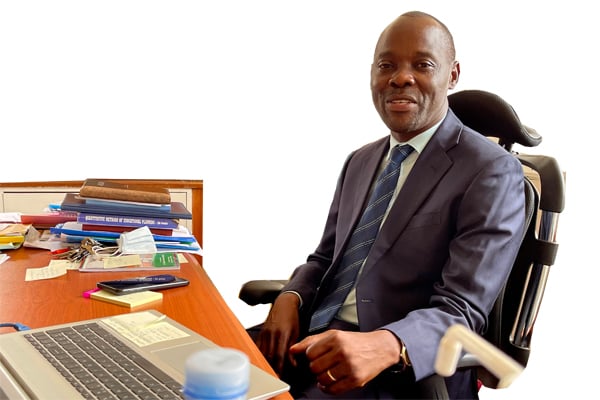Govt brings learning closer with three new seed schools

The State minister for Trade, Industry and Cooperatives, Mr David Bahati (left), commissions St Joseph’s Buhara Secondary School in Kabale District last Thursday. PHOTO/ROBERT MUHEREZA
What you need to know:
- The schools are equipped with furniture and computer labs to aid learning.
- shs8.7b investment. The cost of constructing the three schools with funding from the World Bank and the government.
Government has commissioned three seed secondary schools in Kigezi Sub-region to improve access to education.
The schools include St Joseph’s Buhara Seed Secondary School in Kabale District, Nyamweru in Rubanda District, and Rwamucucu in Rukiga District. The commissioning of Nyakinama seed secondary school in Kisoro District has been scheduled for March 16.
The State minister for Trade Industry and Cooperatives (Industry), Mr David Bahati, presided over the commissioning of St Joseph’s Buhara Seed Secondary School.
He emphasised that Universal Secondary Education should be completely free if the government is to achieve its target of developing human capital.
“Whereas students and pupils under the universal primary and secondary school education government programmes are supposed to be studying for free, there are some schools administrators that still charge some fees from learners. Government is planning to consult all the stakeholders in the education department to ensure that all students under these government schools study for free,” Mr Bahati said.
He thanked President Museveni and the development partners for investing in the education sector by constructing seed schools in every sub-county.
Mr Bahati also encouraged students to take up the opportunity of the magnificent infrastructure to excel in academics. He promised to donate a solar lighting system to the school in one month.
The construction works started in July 2019 under Phase 1 of the Uganda Intergovernmental Fiscal Transfers (UGIFT) programme.
The director of Geses Uganda Ltd, Mr Peter Nkurunungi, whose company constructed the Four Seed Secondary Schools, said six classrooms, one administration block, a science laboratory, an Information Communication Technology library, six teachers houses, six kitchen rooms for the staff, 2-five stance toilets for students, and 4-two stance toilets for the staff at every selected seed secondary school have been constructed and completed.
He added that all classrooms have been equipped with the necessary furniture while the computer labs were equipped.
The head teacher of St Joseph’s Buhara Seed Secondary School, Ms Grace Tumukunde, said they charge Shs120,000 per student because the capitation grant of Shs14m is inadequate to run school activities.
“Because the capitation grant received from the government is not enough to run the school activities, every student is asked to pay money to support the smooth running of the school programmes that include paying for utilities such as electricity and 15 teachers that are not on the government payroll. We have a total of 573 students and 38 teachers,” Ms Tumukunde said.
The State minister for Luweero Triangle and Rwenzori region, Ms Alice Kaboyo, on Wednesday and Thursday presided over the official commissioning of Rwamucucu Seed Secondary School and Nyamweru Seed Secondary School where she thanked the Church of Uganda for donating the land on which the two schools have been built.
She promised to lobby for hydro power connection to the newly-constructed seed secondary schools to enable them operationalise the computer laboratories.
Ms Kaboyo added that whereas a total of 259 seed secondary schools are to be constructed, 117 seed secondary schools were earmarked to be completed in the first phase, 115 in the second phase and 27 in the third phase.
“It’s a privilege to officially open this seed school where we expect a comprehensive learning process to take place and we develop human capital through quality education. Government appreciates the support from development partners such as the World Bank that supported the construction of these seed schools,” Ms Kaboyo said.




